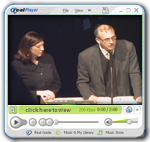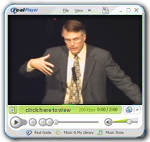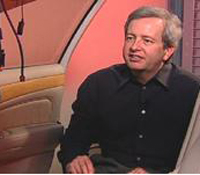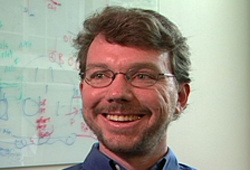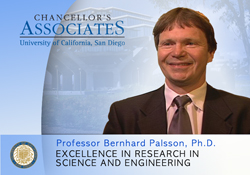Faculty with Links to Calit2 Selected for UCSD Excellence Awards
By Doug Ramsey, 858-822-5825, dramsey@ucsd.edu
|
Two of the five faculty selected this year are based in the Jacobs School of Engineering. Computer Science and Engineering professor Geoffrey Voelker was cited for excellence in undergraduate teaching, and the award for excellence in science and engineering research went to Bioengineering professor Bernhard Palsson.
(Palsson was also cited yesterday as a major player in the field of comparative interactomics, one of Technology Review magazine's top 10 emerging technology fields of 2006; to read more, click here .)
|
Pashler and Dunford have longstanding ties with Calit2 through several of its earliest, high-profile projects.
Pashler was citedfor his pioneering research regarding vision, learning and memory, and his achievements as a frequently cited and published expert in his field. His best-known discovery has been of an "attentional bottleneck" -- the limitations a person encounters when trying to perform two mental tasks at once.
"We find that there are some critical bottlenecks in certain kinds of mental operations that are always done one at a time, even if intuitively they seem trivial and easy, and they tend to involve the planning of actions," said Pashler in a 2004 documentary produced by Calit2. "When it comes to planning two different actions, they are often done sequentially, one at a time. We are now examining whether these bottlenecks occur in driving just as they do in laboratory tasks, and the goal is to use this information and bring it to the driver's attention to improve his performance -- without distracting him further with the warning itself."
|
Pashler is a co-investigator on the $3 million project funded by Nissan Motor Co. and the UC Discovery Grant program. Led by Mohan Trivedi, a professor of Electrical and Computer Engineering and former leader of Calit2's Intelligent Transportation and Telematics layer at UCSD, the multidisciplinary project aims to develop "human centered intelligent driver support systems." Specifically, Pashler and his postdoctoral associate Jonathan Levy have been studying the ability of drivers to talk on a cell phone and undertake another action, such as breaking for a possible hazard ahead.
In addition to his School of Medicine appointment, Dr. James Dunford is medical director of the City of San Diego EMS authority, where he oversees all activities for the paramedic and ambulance services. He has also invested a great deal of his time in such service organizations as the American Heart Association; Project Heart Beat, which Dunford co-founded; the Serial Inebriate Program; and a clean syringe exchange program. "Professor Dunford has distinguished himself as a caring clinician serving our community; a passionate teacher to medical students, residents and fellows; and has made important contributions in advancing research at UCSD," noted Edward W. Holmes, vice chancellor of Health Sciences and dean of the UCSD School of Medicine.
Dr. Dunford has actively participated in two of Calit2's flagship projects in the medical and emergency response fields: Specialized Program Of Translational Research In Acute Stroke (SPOTRIAS), dubbed StrokeDoc, a program to develop wireless and other technologies to improve treatment and diagnosis of stroke, in conjunction with the UCSD Stroke Center; and the Wireless Internet Information System for Medical Response in Disasters (WIISARD). Dunford is a co-investigator on the WIISARD project, and is an active local and national lecturer in emergency medical services including terrorism preparedness.
|
"Students love Professor Voelker's classes because he has the uncanny ability to make extremely challenging curricula contemporary, fun and exciting," said Jacobs School dean Frieder Seible. "He truly inspires his students to experience the thrill of engineering. The vision, commitment and extraordinary efforts Professor Voelker demonstrates through his teaching make him an exemplary member of the UCSD faculty." Voelker is a co-PI on Calit2's Adaptive Systems wireless project funded by Ericsson, and on one of the newest projects of the Center for Networked Systems, called "Network Vivisection" (see webcast link in above box).
|
Another Jacobs School professor and Calit2 participant, Bioengineering professor Bernhard Palsson (who accepted his award on video, because of a prior commitment to speak at a conference in Europe), was recognized for his contributions to tissue engineering strategies, and for his invention of a modern technology for propagation of stem cells. Beyond conducting research to improve cell separation and gene therapy technology, Palsson has also translated his projects into the launch of five start-up companies. He founded or co-founded several biotechnology companies, including Oncosis (purging of occult tumor cells in autologous bone marrow transplants), Cyntellect (instrumentation for high-throughput screening and in situ cell sorting and processing), Genomatica (in silico biology), and Iceland Genomics (tracing the
genetic basis for common human diseases in the Icelandic population.
"Professor Palsson exemplifies how bioengineers can contribute to the advancement of modern biology and medicine," said Jacobs School dean Seible. "His research has paved the way for new understanding of how living systems function, and he has successfully translated that understanding into practice."
UCSD Division of Arts and Humanities Michael A. Bernstein, a participant in Calit2, noted that Literature professor Shelley Streeby "is a remarkably gifted graduate mentor, one whose work with students has had an enduring effect on the development of a new generation of scholars."
Chancellor's Associates is a program for donors who give an annual leadership gift of $1,500 or more to the university. Since 1974, UCSD has recognized 100 extraordinary faculty members with Chancellor's Associates Faculty Excellence Awards.
"It is a pleasure to see this year's Faculty Excellence Awards honorees receive the recognition they so richly deserve," said Marsha Chandler, UCSD senior vice chancellor of Academic Affairs. "They play so many roles well -- they are teachers, researchers, campus citizens and community leaders. Each serves as an excellent representative of the outstanding quality of our faculty."
About UCSD Chancellor's Associates
The UCSD Chancellor's Associates program exists as an opportunity for the university to connect with friends and supporters within the community. Through the years, the group has grown to include more than 400 alumni, parents, faculty, staff and friends from across the country. Chancellor's Associates donors are recognized for their generosity in providing annual leadership gifts of $1,500 or more to be used at the Chancellor's discretion. Chancellor's Associates gifts contribute to the $1 billion fundraisinggoal of The Campaign for UCSD: Imagine What's Next.
Related Links
Chancellor's Associates
Bernhard Palsson Website
Geoffrey Voelker Website
Harold Pashler Website
Creating a New "Driving Ecology" for Enhanced Auto Safety
Smart Cars, Safe Cars
Calit2 Teams with Stroke Center to Enable Remote Evaluation of Potential Stroke Victims
WIISARD


